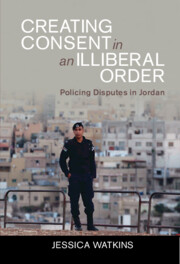Book contents
- Creating Consent in an Illiberal Order
- Cambridge Middle East Studies
- Creating Consent in an Illiberal Order
- Copyright page
- Contents
- Figures
- Maps
- Tables
- Preface
- Acknowledgements
- Note on Transliterations
- Abbreviations
- 1 Introduction
- 2 Strategic Alliances and Amalgamated Social Orders
- 3 State Policing, from the Ottoman Gendarmerie to the Public Security Directorate
- 4 Criminalising Disputes and Disputing Criminality
- 5 Policing Blood Crimes in the (Neo)Tribal Tradition
- 6 Policing Domestic Abuse
- 7 Community Policing After the Uprisings
- 8 From Neoliberal Securitised Policing Back to the Disputing Process
- Bibliography
- Index
- Books in the Series
7 - Community Policing After the Uprisings
Refugees and Representatives
Published online by Cambridge University Press: 02 June 2022
- Creating Consent in an Illiberal Order
- Cambridge Middle East Studies
- Creating Consent in an Illiberal Order
- Copyright page
- Contents
- Figures
- Maps
- Tables
- Preface
- Acknowledgements
- Note on Transliterations
- Abbreviations
- 1 Introduction
- 2 Strategic Alliances and Amalgamated Social Orders
- 3 State Policing, from the Ottoman Gendarmerie to the Public Security Directorate
- 4 Criminalising Disputes and Disputing Criminality
- 5 Policing Blood Crimes in the (Neo)Tribal Tradition
- 6 Policing Domestic Abuse
- 7 Community Policing After the Uprisings
- 8 From Neoliberal Securitised Policing Back to the Disputing Process
- Bibliography
- Index
- Books in the Series
Summary
Post-2011, in the aftermath of the Syrian refugee crisis in Jordan, the promotion of community policing has received notable support from Jordan’s Western allies, and a successful initiative piloted in refugee camps to improve liaison between the police and residents was subsequently expanded to the wider host community. But community policing is an amorphous concept that has varied interpretations in different societies depending on the nature of the prevailing social order. This chapter explores some of the shifting understandings of community policing within the Public Security Directorate, which blend perceptions of Jordan’s tribal identity, with its reputation for low crime rates and a small population, and the notion of civic duty within an increasingly neoliberal society. The latter idea of civic duty, which in what is ultimately an illiberal authoritarian context, restricts the degree to which genuine police–public partnerships are possible in Jordan.
Keywords
Information
- Type
- Chapter
- Information
- Creating Consent in an Illiberal OrderPolicing Disputes in Jordan, pp. 175 - 198Publisher: Cambridge University PressPrint publication year: 2022
